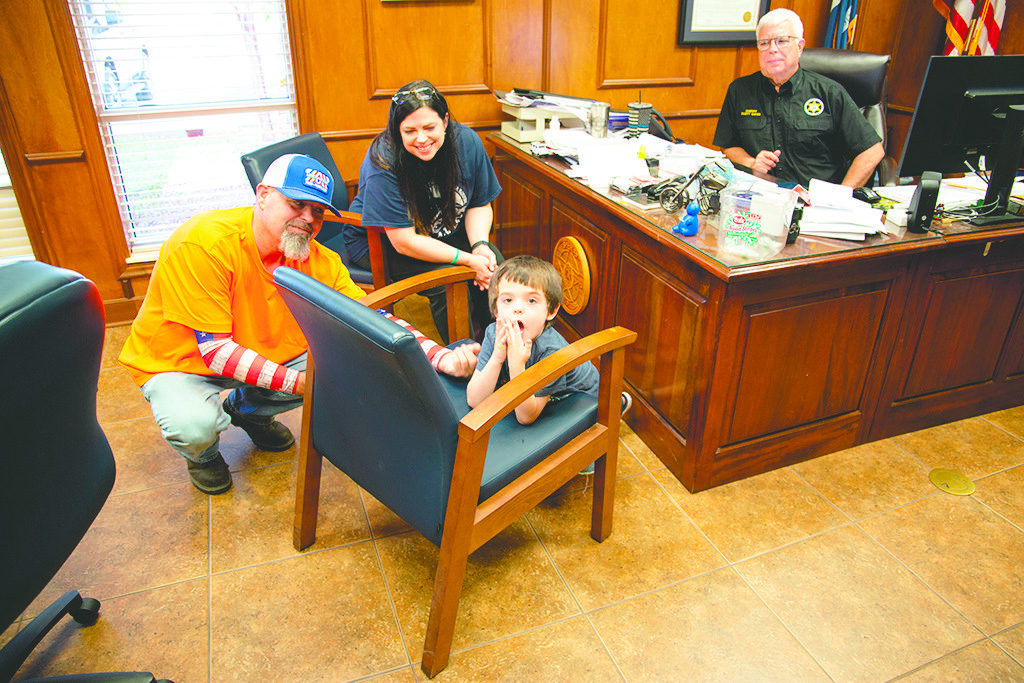
By Luke Britt/Editor
News reports of developmentally disabled people being harmed by police are always tragic, but for Jerome and Avery Wilson of Spearsville, such stories are a frightening reminder that their severely autistic son, Hudson, will always be vulnerable in world that doesn’t understand him.
So when Union Parish Sheriff Dusty Gates announced the Friends of UPSO program last week, they were thrilled and touched and relieved all at the same time, they said, to know that local law enforcement is taking their son’s safety seriously.
The Friends of UPSO program is intended to alert local law enforcement officers responding to incidents that they may encounter a special needs person in a particular home or vehicle, so those officers are less likely to misinterpret unusual behavior.
Four-year-old Hudson is, in every way, a beautiful, sweet-natured boy. He seldom speaks, and when he does it’s often in a kind of code that someone who doesn’t know him might not understand, his father Jerome said. “Like if he says ‘Yes’, he’s really saying ‘No’, but if he says ‘Yes, Yes’, then that’s a ‘Yes’.”
Like many autistic people, certain stimuli can trigger emotional outbursts or agitated behavior from Hudson that someone unaware of his condition might interpret as unruly or aggressive.
“We worry all the time that someone will not understand his behavior. I mean, they don’t. We see it all the time. But if it happened with a police officer, well, that’s really scary for us,” Avery said.
Sheriff Gates said the nature of law enforcement requires officers to make decisions very quickly and sometimes with very little information. “The more information an officer has before he interacts with a citizen, the more likely that officer is to respond appropriately. This program will reduce the potential for the kinds of tragic stories we’ve seen happening elsewhere from happening in Union Parish.”
The Friends program is available to individuals with specials needs like autism, dementia, epilepsy, PTSD, Down Syndrome, as well as stroke survivors and those who are blind or deaf, and those with other conditions that may affect the way the individual interacts with first responders, Gate said.
Beginning Sept. 1, parents and guardians can stop by the UPSO front lobby and complete a questionnaire that will help law enforcement understand what type of special needs person they may encounter if they respond to a given home or engage in a traffic stop of a vehicle in which a special needs person may be riding. Those who register for the program will be given decals to affix to a front door or window of a house or windshield of car where it is easily visible.
The relevant information provided in the questionnaire will be entered into the UPSO dispatch system so deputies are alerted not only to the possible presence of a special needs person but also to that person’s particular condition before the interaction even begins.
“If an officer knows he might encounter someone with autism or dementia, for example, before he arrives at a home or approaches a vehicle, then he has time to put himself in the proper frame of mind to respond appropriately to behavior he might otherwise interpret as aggression or impairment,” Gates said.
Coupled with the alert system, Gates said his deputies will be trained on what to expect when they encounter people with various conditions.
“In some cases they may need to avoid using a loud or harsh tone of voice,” Gates said. “Or maybe they need to be patient because someone needs a long time to respond to questions. Whatever the case might be, this program and the training we provide will go a long way toward protecting our most vulnerable residents.”
 fgazette.com Community news site for Union Parish Louisiana
fgazette.com Community news site for Union Parish Louisiana